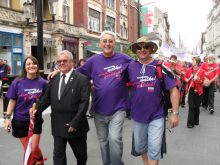 Following on from my post about Hope, I include another section, this time on Empowerment, from the second last chapter, ‘Factors That Facilitate Recovery’, of my recently published eBook, Our Recovery Stories: Journeys from Drug and Alcohol Addiction.
Following on from my post about Hope, I include another section, this time on Empowerment, from the second last chapter, ‘Factors That Facilitate Recovery’, of my recently published eBook, Our Recovery Stories: Journeys from Drug and Alcohol Addiction.
‘As emphasised throughout this book, recovery is something done by the person with the substance use problem, not by a treatment practitioner or other person. The major sources of power driving the recovery process are the person’s own efforts, energies, strengths, interests and hope. Treatment practitioners, and others involved in the person’s recovery journey, can facilitate the recovery process by encouraging and supporting the person’s own hopes, strengths, interests, energies and efforts.
Given the above, self-determination and empowerment are key foundations underlying recovery. To move forward, recovering people need to have a sense of their own capability, their own power. Their hope needs to be focused on things they can do for themselves, rather than on new ‘cures’ or fixes that someone else will discover or give them. The person must be the author and arbiter of their own recovery.
‘I understand that whatever the help that is offered, ultimately the movement from addiction into recovery has to come from deep within the individual. If I hadn’t embraced treatment and opened myself up to a painful process, it would have had little impact. Nobody could make me recover from my addiction. I had to take certain opportunities as they occurred.’ Paul
Those people trying to help a person on their recovery journey must respect and facilitate the person’s autonomy, as well as their right to make choices about the services and supports they believe will assist their recovery. People trying to help should not be controlling and coercive.
After being prescribed a low dose of methadone which failed to stop her experiencing withdrawal symptoms at work, Sapphire was seen by a more understanding and better-informed GP [General Practitioner]. She was listened to and her wishes were met.
‘It felt great to freely talk about what was really going on in my life. My new GP listened to what I had to say and treated me like any other (non-addict) person. She also did not repeat ad nauseam that, ‘Everything in my life would be rosy if I was abstinent’, which was the party line of the CDT [Community Drug Team].
My GP increased my methadone dose and I was able to function totally normally without having to buy any methadone on top, or without feeling like I wanted to use any other drugs. I felt like any other person…’
Sadly, this GP later passed away and Sapphire faced new problems with her treatment service.
‘As I was testing negative for all drugs other than those I was being prescribed—that is, I was not taking anything on top of my prescription—the CDT kept insisting they reduce my methadone dose. They believed that I didn’t need the same dose of methadone, as I wasn’t now using illicit or unprescribed drugs. They were ignoring the fact that it was because of this dose of methadone that I was able to abstain from other drugs and alcohol.
“As the medicine is working, she needs less of it!”’ Our Recovery Stories: Journeys from Drug and Alcohol Addiction. Copyright © 2021 by David Clark


